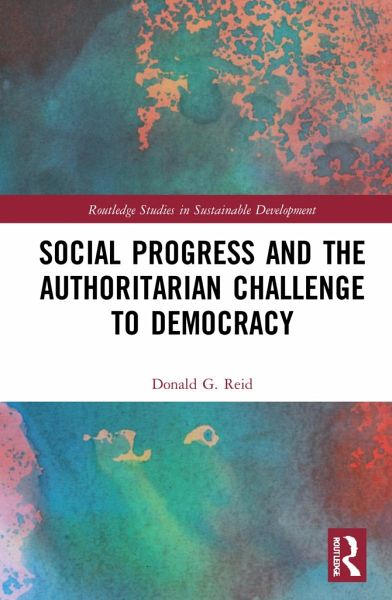
Social Progress and the Authoritarian Challenge to Democracy
Versandkostenfrei!
Versandfertig in 6-10 Tagen
154,99 €
inkl. MwSt.
Weitere Ausgaben:

PAYBACK Punkte
77 °P sammeln!
Social Progress and the Authoritarian Challenge to Democracy examines the authoritarian challenge to present-day democracy through a framing of social progress theory and the idea of the social contract. Building on the author's previous work, this book discusses whether social progress is linear and on a continual upward trajectory to human betterment, or if there are peaks and troughs along the way. More importantly, it questions that, if social progress exists, is it compatible with social and environmental sustainability?At the outset the book introduces the concepts of social contract the...
Social Progress and the Authoritarian Challenge to Democracy examines the authoritarian challenge to present-day democracy through a framing of social progress theory and the idea of the social contract. Building on the author's previous work, this book discusses whether social progress is linear and on a continual upward trajectory to human betterment, or if there are peaks and troughs along the way. More importantly, it questions that, if social progress exists, is it compatible with social and environmental sustainability?
At the outset the book introduces the concepts of social contract theory and the idea of human social progress, long considered to be settled conditions, now ripe for further examination. Each chapter carefully analyses the contemporary struggle between democracy and authoritarianism, using examples from the USA as a foundation to discuss and compare democracies from around the world encountering the pressures of rising authoritarianism, including anti-immigration, xenophobia and anti-institutionalism. It argues that if the climate crisis is to be urgently addressed as required, the rise in authoritarian thinking, with its focus on maintaining power and the creation of individual wealth, presents a challenge to both our societal foundations and environmental sustainability.
Highlighting and analysing topics of critical importance to today's society, this book will have widespread appeal to academics, researchers and postgraduate students throughout the social sciences including sociology, political science, philosophy, environmental sustainability and development studies.
At the outset the book introduces the concepts of social contract theory and the idea of human social progress, long considered to be settled conditions, now ripe for further examination. Each chapter carefully analyses the contemporary struggle between democracy and authoritarianism, using examples from the USA as a foundation to discuss and compare democracies from around the world encountering the pressures of rising authoritarianism, including anti-immigration, xenophobia and anti-institutionalism. It argues that if the climate crisis is to be urgently addressed as required, the rise in authoritarian thinking, with its focus on maintaining power and the creation of individual wealth, presents a challenge to both our societal foundations and environmental sustainability.
Highlighting and analysing topics of critical importance to today's society, this book will have widespread appeal to academics, researchers and postgraduate students throughout the social sciences including sociology, political science, philosophy, environmental sustainability and development studies.













